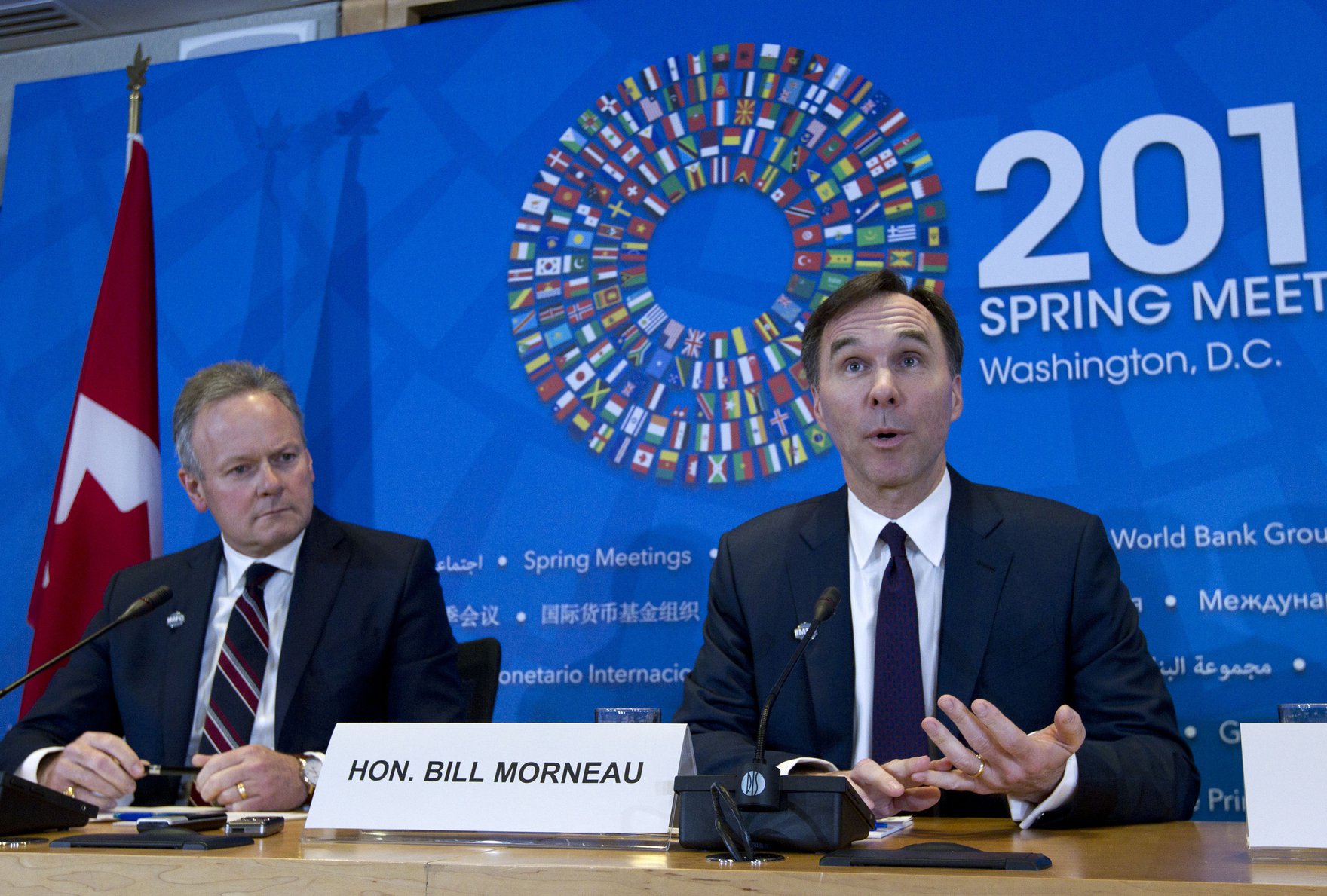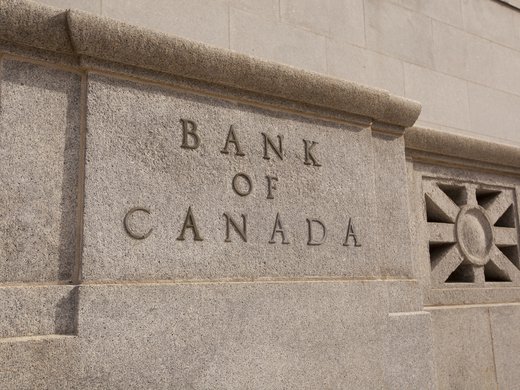It was an extraordinary glimpse at the dialogue that goes on between finance minister and central bank chief.
While Finance Minister Bill Morneau’s decision late last year to renew the Bank of Canada’s mandate for another five years without material change was expected, for those who cared to look closely, there was a surprise tucked into the announcement. For the first time, the central bank released the letter that the governor sent to the finance minister explaining the institution’s recommendation for the new mandate. The document contained context that wouldn’t have been otherwise available, including a subtle shift in the Bank of Canada’s position on macroprudential regulation.
The International Monetary Fund (IMF) for years has flagged important weaknesses in Canada’s approach to safeguarding financial stability. The Finance Department’s habit is to ignore the warnings, expressing confidence that the absence of bank failures is evidence the Canadian system works. The Bank of Canada had been agnostic on the matter, saying nothing that would upset the status quo. But at some point last year, the central bank’s leaders appear to have decided that Canada could potentially do better. In his letter to Morneau, Poloz attempted to nudge the political authority into a discussion on the subject. Here is the relevant section, quoted in full:
“The existing macroprudential framework in Canada has functioned reasonably well. Nevertheless, the bank supports efforts to enhance the framework that are in line with the best-practice recommendations of the International Monetary Fund. When it comes to the use of macroprudential policy, the bank is very well placed to help ensure that macroprudential policy and monetary policy are effectively working together to promote both macroeconomic and financial stability at the same time. The bank looks forward to exploring ways to strengthen the existing macroprudential framework.”
Poloz could have been more forceful. Domenico Lombardi, director of the Global Economy Program at the Centre for International Governance Innovation (CIGI), and co-authors Samuel Howorth, Pierre Siklos and Samantha St. Amand have done excellent work in both defining international best practice and then grading major economies against that standard. When it comes to Canada, their message is clear: Don’t believe the hype.
“The overarching impression is that Canada’s financial system is resilient and well placed to meet any future large shock that will threaten financial system stability,” they write in a recent paper. “There is little evidence to support this case,” they continue. “And although there is much for which to commend the current policy strategy, given past performance, Canada can no longer claim to fully follow best practice in the realm of financial system stability regimes.”
Their assessment is based on an index Lombardi and Siklos created to rank international financial stability regimes. Their criteria include inter-agency coordination, the ability of authorities to act independently, and transparency and accountability. Canada scores well on coordination: two informal committees of senior officials responsible for financial regulation have been meeting semi-regularly in Ottawa for years. But these committees meet in private, and they have no ability to implement macroprudential policy on their own. None of Canada’s financial regulators have an explicit mandate to look out for financial stability. These shortcomings form the crux of the IMF’s critique, and they concern Lombardi and his co-authors. “While Canada has a good foundation for building a robust financial stability policy regime, the Canadian government has yet to adapt the system in full to address gaps in our understanding of financial system stability governance revealed by the global financial crisis,” the CIGI team writes. “The current arrangement leaves the financial system susceptible to future shocks from regulatory ‘grey areas’ — those lacking responsible and accountable institutions — and impedes the potential speed of responses to adverse developments.”
Back to Ottawa at the time of the inflation-target announcement. It is one thing for a government to ignore the IMF — that happens all the time. But you might think prodding from the central bank would have an effect. It doesn’t look like it. About a month after receiving Poloz’s letter, and less than a week after resetting the Bank of Canada’s mandate, Morneau spoke at an event organized by the Toronto Board of Trade. He mostly reflected on his first years in office, but he spared some time in his speech for financial stability. “As Finance Minister, I take my broad responsibility for Canada’s financial stability very seriously,” he said. “Luckily, Canada has what it takes to succeed. But we must remain vigilant to maintain our strong foundation.”
Promising.
“Work and guidance released by the IMF and the Financial Stability Board (FSB) suggest that effective regimes to promote financial stability — also known as macroprudential governance — require, among other things, clear roles and responsibilities for policy tools to bolster financial stability,” Morneau said. “I agree.”
At this point, anyone familiar with the IMF’s concerns about Canada’s financial governance might have expected the finance minister to use his next breath to announce that he was elevating the status and authority of one of those informal committees. But that isn’t what Morneau did. Instead, he deployed a classic political trick, repackaging the old to make it seem new. “So let me be clear,” the finance minister continued. “At the end of the day, I am ultimately responsible for supporting financial security, and the stability of our financial system.”
The late Jim Flaherty, Canada’s finance minister during the financial crisis, said almost exactly the same thing in August 2009. The United States, the United Kingdom and others were overhauling their regulatory regimes, recognizing that macroprudential policy would be as important as monetary policy in the future. Logically, decisions on when and how to deflate asset-price bubbles should be made at some distance from politics. The United States created the Financial Stability Oversight Council and the United Kingdom empowered the Bank of England to oversee the financial system. Flaherty was unmoved. “The minister of finance, supported by the Department of Finance, has ultimate responsibility for the financial system and authority for all financial sector legislation,” he declared at the time.
Morneau’s use of the IMF and the FSB to justify his official embrace of the Flaherty doctrine required cheek. It’s true that both favour clear lines of authority. Yet neither thinks it is a good idea that elected officials retain total control of macroprudential policy. Flaherty once told me that he was philosophically opposed to giving too much power to technocrats in a democracy. The problem with that in the Canadian context is that there is no effective way to hold the finance minister to account. After Flaherty died in April 2014, he was replaced by Joe Oliver. After Canada’s federal election in 2015, both the National Post and Bloomberg News reported that Oliver and former prime minister Stephen Harper dismissed advice from officials that something should be done to cool the housing market. The reason for ignoring the experts was obvious: ahead of an election, a politician has little incentive to anger voters by making it more difficult to buy a house.
Morneau, fresh off his first-ever election victory and backed by a majority government, proceeded to do what Harper and Oliver wouldn’t. He implemented a number of mortgage restrictions meant to ease demand in overheated markets, especially in Vancouver and Toronto. He even boasted about it in his speech at the Toronto Board of Trade. “I will continue to act to ensure that household debt levels are sustainable, that lenders are acting prudently, and that increases in interest rates or a housing market downturn don’t put at risk the economic growth we are working so hard to accelerate,” Morneau said.
So there you have it: Canadian macroprudential policy will be run through the office of the finance minister, who in his spare time is the member of Parliament for Toronto Centre. That’s right: Canada’s self-appointed financial guardian will need to win re-election in the country’s hottest housing market if he decides to stay in politics. It is fair to speculate that if the consensus in Ottawa was that Canada was facing a housing bust, then Morneau had extra incentive to act quickly. That’s because the closer he gets to an election, the harder it becomes to do the right thing.



